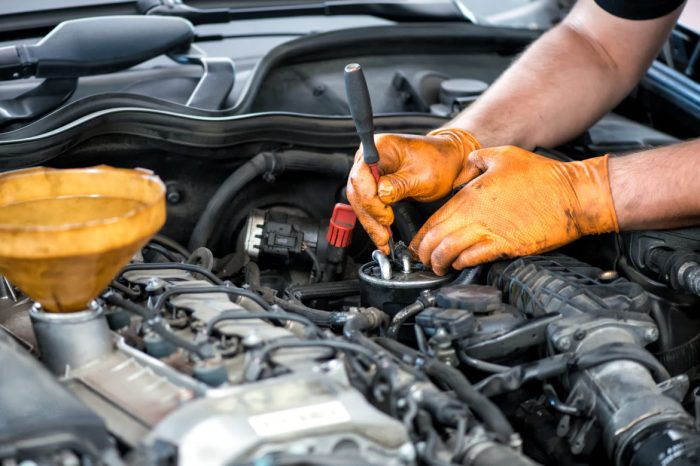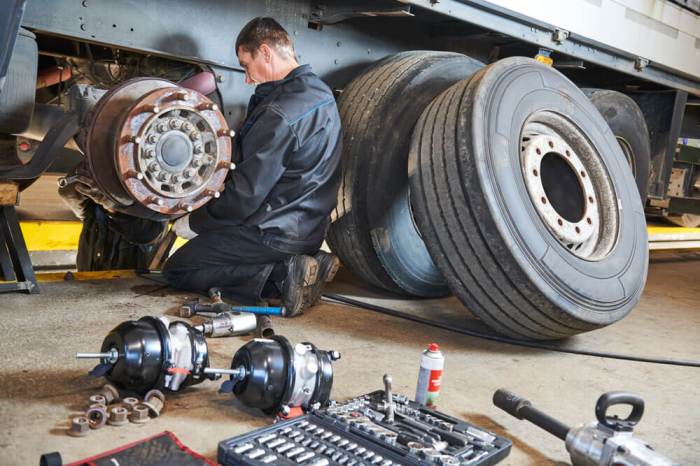Starting off with truck maintenance, making sure your wheels stay rolling smoothly and safely is key to a trouble-free journey. From routine checks to professional tune-ups, we’ve got you covered.
Importance of Truck Maintenance
Regular maintenance is like the lifeblood of trucks, keeping them running smoothly and efficiently. Just like how you need to take care of yourself to stay healthy, trucks need proper maintenance to avoid breakdowns and accidents on the road. Neglecting maintenance can lead to costly repairs, unexpected downtime, and even accidents that can put lives at risk. It’s all about keeping your truck in top shape for the long haul.
Preventing Breakdowns and Accidents
Proper maintenance plays a crucial role in preventing breakdowns and accidents on the road. Regular inspections and servicing can help identify and fix potential issues before they escalate into major problems. From checking the brakes to ensuring proper tire pressure, every aspect of truck maintenance contributes to safe and reliable operation. By staying on top of maintenance schedules, truck drivers can reduce the risk of unexpected breakdowns and accidents, keeping themselves and others safe on the road.
Impact on Longevity
Neglecting maintenance can significantly impact the longevity of a truck. Failure to address minor issues can lead to more extensive damage over time, reducing the overall lifespan of the vehicle. By following a routine maintenance schedule and addressing any concerns promptly, truck owners can extend the life of their trucks and maximize their investment. Regular maintenance not only ensures safe operation but also contributes to the longevity and performance of the truck in the long run.
Types of Truck Maintenance

Regular maintenance of trucks is essential to ensure their optimal performance, longevity, and safety on the road. There are various types of maintenance tasks that need to be carried out to keep trucks in top condition.
Engine Maintenance
Engine maintenance is crucial to ensure that the heart of the truck is functioning properly. Some routine maintenance tasks include:
- Regular oil changes
- Checking and replacing air filters
- Inspecting and replacing spark plugs
- Monitoring coolant levels
Brake Maintenance
Properly functioning brakes are essential for the safety of the driver, passengers, and other vehicles on the road. Some routine maintenance tasks include:
- Checking brake pads and replacing them when worn
- Inspecting brake lines for leaks or damage
- Checking brake fluid levels
Tire Maintenance
Tire maintenance is important for fuel efficiency, traction, and overall safety. Some routine maintenance tasks include:
- Checking tire pressure regularly
- Rotating tires to ensure even wear
- Inspecting tires for signs of damage or wear
- Replacing tires when tread depth is low
Fluid Maintenance, Truck maintenance
Various fluids are essential for the proper functioning of a truck. Some routine maintenance tasks include:
- Checking and topping up engine oil
- Checking and topping up transmission fluid
- Checking and replenishing brake fluid
- Checking and refilling windshield washer fluid
Preventive vs. Corrective Maintenance
Preventive maintenance involves proactive measures taken to prevent breakdowns and ensure the smooth operation of the truck. This includes regular inspections, servicing, and replacement of parts before they fail. On the other hand, corrective maintenance is carried out in response to a breakdown or malfunction. It involves repairing or replacing parts after they have failed, which can lead to downtime and costly repairs.
Signs of Needed Maintenance
When it comes to keeping your truck in top condition, it’s essential to pay attention to the signs that indicate maintenance is needed. Ignoring these signs can lead to more significant problems down the road.
Worn-out Brake Pads
- Squeaking or squealing noises when applying brakes
- Reduced brake responsiveness or longer stopping distances
- Visible wear on brake pads
Low Oil Levels
- Dashboard warning light indicating low oil pressure
- Burning smell coming from the engine
- Dark, dirty oil on the dipstick
DIY Truck Maintenance Tips
Taking care of your truck doesn’t always have to involve a trip to the mechanic. By performing some basic maintenance tasks yourself, you can keep your truck running smoothly and prevent costly repairs down the road.
Checking Oil Levels Regularly
- Make sure your truck is parked on a level surface before checking the oil.
- Locate the oil dipstick, usually marked with a bright color, and pull it out.
- Wipe the dipstick clean with a cloth, reinsert it fully, then pull it out again to get an accurate reading.
- Check the oil level against the markings on the dipstick and top up if needed with the recommended oil for your truck.
- Regularly changing the oil according to your manufacturer’s recommendations is crucial for keeping your engine in good condition.
Changing the Air Filter
- Locate the air filter housing under the hood of your truck.
- Open the housing and remove the old air filter carefully, making sure no debris falls into the intake.
- Inspect the new air filter for any damage before installing it in the housing.
- Close the housing securely and make sure the air filter is properly seated.
- Regularly changing the air filter helps improve fuel efficiency and prolongs the life of your engine.
Importance of Professional Maintenance

In the world of truck maintenance, entrusting your vehicle to a professional mechanic can make all the difference in keeping it running smoothly and efficiently. Let’s dive into the reasons why professional maintenance is crucial for your truck.
Benefits of Professional Maintenance
- Professional mechanics have the expertise and training to accurately diagnose and address any issues your truck may have, ensuring that problems are fixed correctly the first time.
- Regular professional maintenance can help identify potential problems early on, preventing costly breakdowns and repairs down the line.
- By following the manufacturer’s maintenance schedule, professional mechanics can ensure that your truck is always in optimal condition, maximizing its lifespan and performance.
